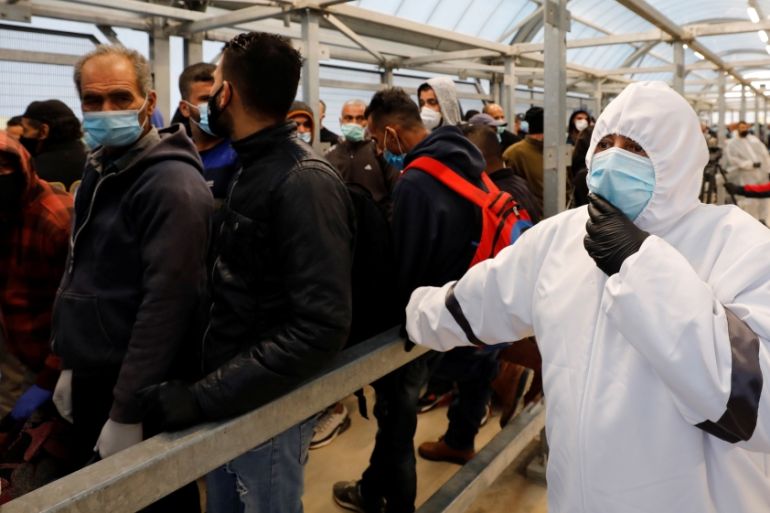Palestinians, Israelis face new lockdowns amid coronavirus surge
Easing of restrictions led to a steady uptick in cases in the occupied West Bank and Israel over the past month.

Israel ordered thousands of people into quarantine after a contentious phone surveillance programme resumed, as Palestinians in the occupied West Bank returned to life under lockdown following a surge in coronavirus cases in both areas.
A statement on Sunday from Israel’s health ministry said “many” messages had been sent to Israelis following the renewed involvement of the Shin Bet domestic security agency. The Israeli daily Haaretz reported more than 30,000 people were notified they must enter quarantine since Thursday.
Keep reading
list of 4 itemsMexico’s teachers seek relief from pandemic-era spike in school robberies
‘A bad chapter’: Tracing the origins of Ecuador’s rise in gang violence
Why is the US economy so resilient?
After imposing strict measures early on during the first wave of infections, Israel and the occupied Palestinian territories appeared to have contained their outbreaks, with each reporting only a few dozen new cases a day in May.
But an easing of restrictions led to a steady uptick in cases over the past month.
“We are at the height of a new corona offensive. This is a very strong outbreak that is growing and spreading in the world and also here,” Israeli Prime Minister Benjamin Netanyahu said on Sunday.
|
|
“We are in a state of emergency,” he said, adding Israel would need to further clamp down to rein in the virus.
Israel is now reporting about 1,000 new cases a day, higher than its peak during the previous wave. It is set to reimpose restrictions in response, limiting occupancy in bars, places of worship, and event spaces to 50 people. It is also requiring citizens to wear masks and has urged more stringent social distancing.
Since the start of the outbreak, Israel has seen more than 29,000 cases and 330 deaths. More than 17,000 people have recovered.
Phone surveillance
With its contact tracing apparatus struggling to keep up with the mounting caseload, Israel last week redeployed domestic security service Shin Bet to use its sophisticated phone surveillance technology to track Israelis who have come in contact with infected people, and then notify them they must enter home quarantine.
The measure is typically used to thwart attacks by tracking Palestinian fighters. The contentious tactic was used when the outbreak first emerged earlier this year.
When civil rights groups challenged it in the country’s Supreme Court, the court threatened to halt its use unless it was put under legislative oversight. The Israeli Knesset has since done so twice using temporary legislation, most recently on Wednesday.

While officials have defended the practice as a life-saving measure, civil rights groups attacked it as an assault on privacy rights. Analysts say the measure may act as a dragnet that could needlessly force some into quarantine.
Al Jazeera’s Harry Fawcett, reporting from West Jerusalem, said Israel’s phone monitoring stirred outrage from human rights groups, but it has been deemed necessary by the government.
“This is the third time internal Israeli security service Shin Bet has been sanctioned to monitor people’s phones,” he said.
|
|
“This is not an app people voluntarily download. Here security service monitors who people have been associating with and sending them a text message to quarantine if it is assessed they need to do so.”
Israeli media reported of the thousands ordered into home quarantine, many Israelis complained they struggled to appeal quarantine orders because the health ministry’s hotline was overwhelmed and ill-equipped to handle such a deluge.
Critics alleged amid the dwindling cases, Israel let down its guard, reopened too quickly and failed to capitalise on its gained time to improve its contact-tracing capabilities to contend with a second wave.
Netanyahu, who was largely seen as having capably handled the first wave, has suffered in public opinion polls from his approach this time around. In May, he proudly urged Israelis to go out, grab a coffee or a beer, and “have fun”.
Lockdown in occupied West Bank
In the occupied West Bank, residents were ordered on Friday to remain at home unless they need to buy food or medicine.
On Sunday, Palestinian President Mahmoud Abbas extended a state of emergency in the territory for 30 days, a measure that allows officials to impose additional virus restrictions, including extending lockdowns, banning movement between cities, and deploying security forces.
Palestinian authorities fear if the outbreak spirals out of control, it could overwhelm its under-resourced healthcare system.
In the past two weeks, Palestinian health authorities have reported more than 1,700 confirmed coronavirus cases in the occupied West Bank’s city of Hebron and hundreds more in Bethlehem and Nablus.
The West Bank has reported more than 3,700 cases since the outbreak began. More than 400 have died.